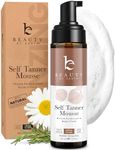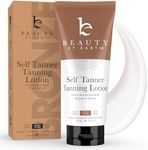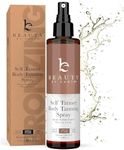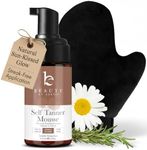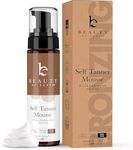Buying Guide for the Best Tanning Oils
Choosing the right tanning oil can make a big difference in your tanning experience, whether you're sunbathing at the beach or relaxing by the pool. The best tanning oil for you will depend on your skin type, how much sun protection you need, and the kind of tan you want to achieve. It's important to understand the key features of tanning oils so you can pick one that helps you get a beautiful tan while also caring for your skin.SPF (Sun Protection Factor)SPF stands for Sun Protection Factor, and it tells you how much protection the oil offers against the sun’s harmful UV rays. This is important because while tanning, you still need to protect your skin from burning and long-term damage. Tanning oils come with different SPF levels, usually ranging from no SPF at all to SPF 30 or higher. Oils with low or no SPF are best for people with darker skin tones or those who tan easily and rarely burn, while higher SPF oils are better for fair-skinned people or anyone who wants extra protection. Think about your skin’s sensitivity to the sun and how long you plan to be outside when choosing the right SPF for you.
Moisturizing IngredientsMoisturizing ingredients in tanning oils help keep your skin hydrated while you’re in the sun, which can prevent dryness and peeling. Common moisturizers include coconut oil, aloe vera, and vitamin E. Oils with richer moisturizing properties are great for people with dry or sensitive skin, while lighter oils may be better for those with oily or combination skin. Consider your skin type and how much hydration you need when picking a tanning oil.
Bronzing AgentsSome tanning oils contain bronzing agents, which are ingredients that give your skin an instant sun-kissed glow even before your natural tan develops. These can be helpful if you want immediate color, but they may not be necessary if you prefer a gradual, natural tan. If you want a quick boost in color, look for oils with bronzers; if you want to avoid any artificial tint, choose a plain tanning oil.
ScentThe scent of a tanning oil can make your tanning experience more enjoyable. Some oils have tropical or fruity fragrances, while others are unscented or have a mild, natural smell. If you’re sensitive to fragrances or have allergies, you might prefer an unscented oil. If you enjoy a pleasant aroma while tanning, choose a scent that appeals to you.
Water ResistanceWater resistance refers to how well the tanning oil stays on your skin when you swim or sweat. If you plan to be in and out of the water or are likely to sweat, a water-resistant oil will help maintain your tan and protect your skin longer. If you’re mostly sunbathing without much activity, water resistance may be less important. Think about your tanning environment and activities when deciding if you need this feature.
Natural vs. Synthetic IngredientsTanning oils can be made with natural ingredients, synthetic chemicals, or a mix of both. Natural oils are often gentler on sensitive skin and may be preferred by those who want to avoid artificial additives. Synthetic ingredients can sometimes offer longer-lasting results or added benefits, but may not suit everyone. Consider your skin’s sensitivity and your preference for natural or synthetic products when making your choice.









